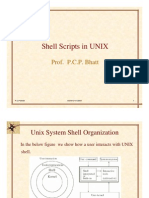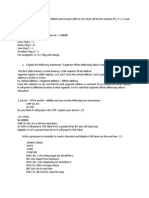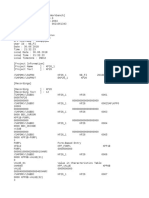Perl - How Can I Allow Undefined Options When Parsing Args With Getopt - Stack Overflow
Uploaded by
nobody ZhangPerl - How Can I Allow Undefined Options When Parsing Args With Getopt - Stack Overflow
Uploaded by
nobody ZhangCalling all who code. Take the 2023 Developer Survey.
How can I allow undefined options when parsing args with Getopt
Asked 12 years, 11 months ago Modified 11 years, 3 months ago Viewed 12k times
If I have a command line like:
19 my_script.pl -foo -WHATEVER
My script knows about --foo , and I want Getopt to set variable $opt_foo , but I don't know anything about -WHATEVER . How can I tell Getopt to
parse out the options that I've told it about, and then get the rest of the arguments in a string variable or a list?
An example:
use strict;
use warnings;
use Getopt::Long;
my $foo;
GetOptions('foo' => \$foo);
print 'remaining options: ', @ARGV;
Then, issuing
perl getopttest.pl -foo -WHATEVER
gives
Unknown option: whatever
remaining options:
perl getopt getopt-long
Share Improve this question Follow edited Feb 10, 2012 at 18:40 asked Jun 8, 2010 at 23:22
Ross Rogers
23.3k 27 108 164
3 Answers Sorted by: Highest score (default)
You need to configure "pass_through" option via Getopt::Long::Configure("pass_through");
23 Then it support actual options (e.g. stuff starting with "-" and without the special "--" delimiter to signify the end of "real" options).
Here's perldoc quote:
pass_through (default: disabled)
Options that are unknown, ambiguous or supplied with an invalid option value are passed through in instead of being flagged as errors.
@ARGV
This makes it possible to write wrapper scripts that process only part of the user supplied command line arguments, and pass the remaining
options to some other program.
Here's an example
$ cat my_script.pl
#!/usr/local/bin/perl5.8 -w
use Getopt::Long;
Getopt::Long::Configure("pass_through");
use Data::Dumper;
my %args;
GetOptions(\%args, "foo") or die "GetOption returned 0\n";
print Data::Dumper->Dump([\@ARGV],["ARGV"]);
$ ./my_script.pl -foo -WHATEVER
$ARGV = [
'-WHATEVER'
];
Join Stack OverflowShare
to findImprove
the best
thisanswer
answer toFollow
your technical question, Sign up with email Sign upedited Jun 9, 2010 at 14:31
with Google Sign up withanswered
GitHub Jun 8, 2010
Signatup23:53
with Facebook
help others answer theirs.
DVK
126k 32 210 325
1 A ha, that would explain why I didn't find it... :) – Ether Jun 9, 2010 at 0:08
4 I find it absolutely infuriating reading about some neat option on perldoc website and then go back to my mesosoic corporate Perl installation and find that the
exact perfect option I've found requires a flux capacitor, or at least a CPAN module upgrade – DVK Jun 9, 2010 at 0:31
1 Are you sure pass_through isn't available with 5.8? I just checked perldoc Getopt::Long for 5.6.1 (and you thought you were pre-historic ;)) and it's there.
– Zaid Jun 9, 2010 at 8:31
@Zaid - you're absolutely right! I didn't quite read the POD right and was looking for an option configured through import ; and this one is done via special
Configure() call. I have updated my answer. – DVK Jun 9, 2010 at 14:32
I just added a feature request to the MooseX::Getopt queue to allow such configuration: rt.cpan.org/Ticket/Display.html?id=58704 (so if you like it, please reply
with a "me too") :) – Ether Jun 23, 2010 at 18:11
Aren't the remaining (unparsed) values simply left behind in @ARGV ? If your extra content starts with dashes, you will need to indicate the end of the
options list with a :
1
--
#!/usr/bin/perl
use strict;
use warnings;
use Getopt::Long;
use Data::Dumper;
my $foo;
my $result = GetOptions ("foo" => \$foo);
print Dumper([ $foo, \@ARGV ]);
Then calling:
my_script.pl --foo -- --WHATEVER
gives:
$VAR1 = [
1,
[
'--WHATEVER'
]
];
PS. In MooseX::Getopt, the "remaining" options from the command line are put into the extra_argv attribute as an arrayref -- so I'd recommend
converting!
Share Improve this answer Follow edited Jun 9, 2010 at 0:09 answered Jun 8, 2010 at 23:41
Ether
52.8k 13 86 159
They aren't if they look like options. Instead, an error like Unknown option: WHATEVER will be issued to STDERR. – Robert P Jun 8, 2010 at 23:45
:] Indeed! Haha, I added an example like that to the question, too. – Robert P Jun 8, 2010 at 23:48
I think the answer here, sadly though, is "no, there isn't a way to do it exactly like you ask, using Getopt::Long, without parsing @ARGV on your
own." Ether has a decent workaround, though. It's a feature as far as most people are concerned that any option-like argument is captured as an
0 error. Normally, you can do
GetOptions('foo' => \$foo)
or die "Whups, got options we don't recognize!";
to capture/prevent odd options from being passed, and then you can correct the user on usage. Alternatively, you can simply pass through and
ignore them.
Share Improve this answer Follow answered Jun 8, 2010 at 23:50
Robert P
15.6k 10 68 112
Join Stack Overflow to find the best answer to your technical question, Sign up with email
help others answer theirs.
You might also like
- How To Activate Microsoft Office 2016 Without Product Key Free100% (2)How To Activate Microsoft Office 2016 Without Product Key Free7 pages
- Perl - How To Use Getopt - Long Method - Stack Overflow PDFNo ratings yetPerl - How To Use Getopt - Long Method - Stack Overflow PDF3 pages
- Special Variables: Default Variables and ParametersNo ratings yetSpecial Variables: Default Variables and Parameters8 pages
- Perl Programming: Presented by Mark Bixby Solution Symposium 2001100% (1)Perl Programming: Presented by Mark Bixby Solution Symposium 200139 pages
- Constrained Application Protocol (Coap) : Politecnico Di MilanoNo ratings yetConstrained Application Protocol (Coap) : Politecnico Di Milano27 pages
- Options: A2p Takes An Awk Script Specified On The Command Line (Or From Standard Input) and Produces ANo ratings yetOptions: A2p Takes An Awk Script Specified On The Command Line (Or From Standard Input) and Produces A3 pages
- Options: A2p Takes An Awk Script Specified On The Command Line (Or From Standard Input) and Produces ANo ratings yetOptions: A2p Takes An Awk Script Specified On The Command Line (Or From Standard Input) and Produces A3 pages
- 01_2018-04-12_bwHPC_course_-_Adv_Bash_ScriptingNo ratings yet01_2018-04-12_bwHPC_course_-_Adv_Bash_Scripting39 pages
- Techskills Linuxshellscriptingbasics 6 2 2 Userinput OptionsNo ratings yetTechskills Linuxshellscriptingbasics 6 2 2 Userinput Options1 page
- Windows Powershell 4.0 Language Quick Reference: Useful CommandsNo ratings yetWindows Powershell 4.0 Language Quick Reference: Useful Commands4 pages
- Windows Powershell 4.0 - Language Quick Reference PDFNo ratings yetWindows Powershell 4.0 - Language Quick Reference PDF4 pages
- Argparse Tutorial: Guido Van Rossum and The Python Development TeamNo ratings yetArgparse Tutorial: Guido Van Rossum and The Python Development Team13 pages
- Network Programming With Perl Cheat SheetNo ratings yetNetwork Programming With Perl Cheat Sheet1 page
- Variables+and+Shell+Expansions+CheatsheetNo ratings yetVariables+and+Shell+Expansions+Cheatsheet8 pages
- Asterisk Extensions Configuration GuideNo ratings yetAsterisk Extensions Configuration Guide19 pages
- A Field Guide To The Perl Command Line: Andy LesterNo ratings yetA Field Guide To The Perl Command Line: Andy Lester18 pages
- Education Experience: Iit Dharwad Iit DharwadNo ratings yetEducation Experience: Iit Dharwad Iit Dharwad1 page
- Machine Dependent and Machine Independent Optimizations, Local and Global Optimizations, Code GenerationNo ratings yetMachine Dependent and Machine Independent Optimizations, Local and Global Optimizations, Code Generation2 pages
- Speech Recognition: Prof. Ram Meghe Institute of Technology and Research, Badnera-AmravatiNo ratings yetSpeech Recognition: Prof. Ram Meghe Institute of Technology and Research, Badnera-Amravati13 pages
- DDR Basics, Register Configurations & Pitfalls: July, 2009No ratings yetDDR Basics, Register Configurations & Pitfalls: July, 200953 pages
- DevSecOps A CASE STUDY ON A SAMPLE IMPLEMENTATIONNo ratings yetDevSecOps A CASE STUDY ON A SAMPLE IMPLEMENTATION4 pages
- Advanced C & Programming Logic Design: B.E.Third Semester (Computer Science & Engineering (New) ) (C.B.S.)No ratings yetAdvanced C & Programming Logic Design: B.E.Third Semester (Computer Science & Engineering (New) ) (C.B.S.)2 pages
- Implementation of 32-Bit Wave Pipelining Sparse Tree AddersNo ratings yetImplementation of 32-Bit Wave Pipelining Sparse Tree Adders5 pages
- PROJECT PROFILE ON COMPUTER CENTRE CYBER CAFE AT Imphal PDF0% (1)PROJECT PROFILE ON COMPUTER CENTRE CYBER CAFE AT Imphal PDF2 pages
- C Progragramming Language Tutorial PPT FNo ratings yetC Progragramming Language Tutorial PPT F47 pages
- Ipsec Support and Volte Components Updates: by Aleksandar YosifovNo ratings yetIpsec Support and Volte Components Updates: by Aleksandar Yosifov13 pages
- Practise Quiz Ccd-410 Exam (02-2014) - Cloudera Quiz LearningNo ratings yetPractise Quiz Ccd-410 Exam (02-2014) - Cloudera Quiz Learning50 pages

























































































